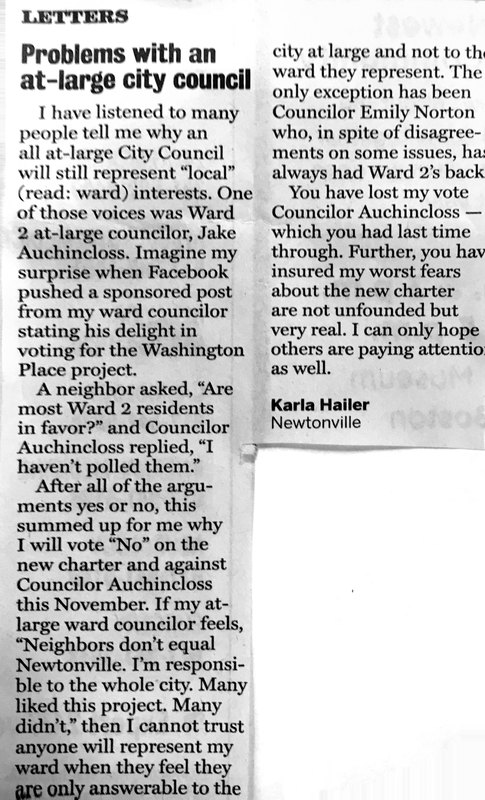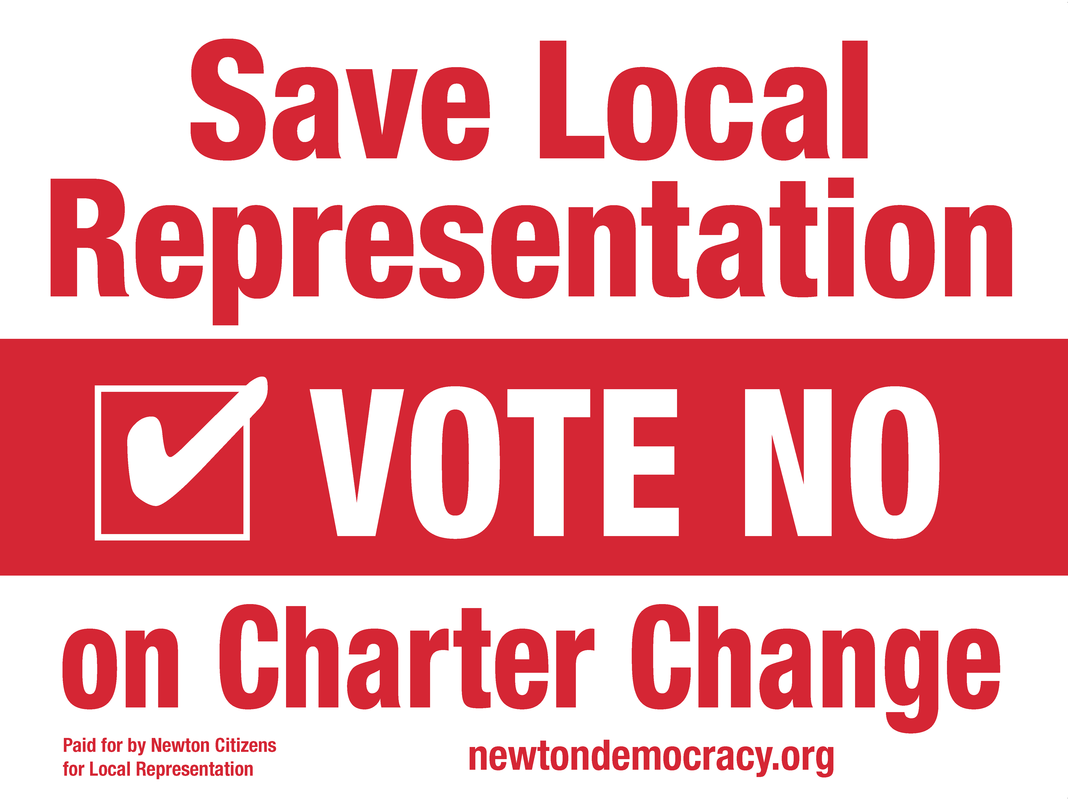|
0 Comments
See the latest NewTV Common Ground episode where Councilor at Large and Mayoral Candidate Amy Mah Sangiolo discusses the importance of retaining Ward-elected City Councilors in the Newton City Council at 40:30
[The League of Women Voters in Everett, WA knows what democracy is. ] After considerable study and discussion, the League of Women Voters of Snohomish County adopted a position in support of bringing more representative government to the city of Everett. We believe that democracy is best served by having a City Council that represents all areas of the city. What better way to bring this about than to divide the city into geographic districts. Then the citizens of that district would elect a representative who knows them, and knows their needs and concerns. Because of our belief that City Council representation will be increased by going to a districting system of electing council members, the league has joined with other like-minded citizens and groups to form a grass-roots coalition called Everett Districts Now. The League of Women Voters of Snohomish County fully supports the initiative drive of this group to divide the city into five geographic districts while maintaining two at-large positions. We believe that this mixed-representation model has the potential for bringing to Everett’s government the diversity that it now lacks while keeping the needs of the city as a whole in focus. The deadline for getting the needed signatures to put this districting initiative on the November ballot is approaching. If you haven’t already signed the petition that will let the people decide this important issue, you can sign it at Zippy’s, at the corner of 15th Street and Rucker Avenue in northwest Everett, or look for an Everett Districts Now table as you enter the Everett Farmers Market on Sundays and sign it there. Do your part to bring more representative government to our city. From: http://www.heraldnet.com/opinion/sign-petition-to-put-council-districts-on-everett-ballot/ The Charter Commission and their Ballot Committee claim in their promotional materials that “the new city charter preserves ward representation and geographic diversity on the council.” They also imply that ward councilors are being retained.
In today’s parlance, these are what are known as “alternative facts.” The charter on the ballot in November eliminates ward councilors, i.e. those elected at the village-level by ward residents, and eliminates geographic balance in the council composition. Instead, all 12 councilors would be elected citywide; eight of the “councilors at large” would have a ward residency requirement, while four would not. So not only would you lose your village-level representative, there is nothing to prevent five of the 12 councilors from coming from the same neighborhood. Citywide elections tend to favor the wealthy and well-connected, so we could see geographic imbalance where five councilors all come from a wealthy or politically active ward. For more details please visit http://newtondemocracy.org. Emily Norton, ward councilor, Ward 2 By GABRIELLE EMANUEL
Lowell’s City Council is preparing to take a controversial vote on the future of the city’s dilapidated high school. Should they renovate, or build an entirely new building in a different neighborhood? This comes as a lawsuit is challenging the legitimacy of the council itself. Several Latino and Asian-American residents filed the suit, arguing that an at-large – rather than a ward-based – election system keeps minority groups out of power. Right now, the entirely white City Council and School Committee make decisions for a city that's roughly half non-white. Less than a mile from City Hall, a sign reads: Cambodia Town. This area is home to one of the largest Cambodian communities in the country. At the heart of the community, there’s a park. But for a long time, there was a problem: unlike most other parks in Lowell, there were no lights at night. “We talked to the city year after year. We talk to the city and elected officials,” said Vesna Nuon. “Nothing happened.” Read the full story and listen to the audio on the WGBH site. I have lived in Newton since 1950. Unfortunately, over recent years, I see mistakes of the past repeated because those in charge today have forgotten or never understood earlier decisions.
Like many, I received a phone call to “sound out” my opinions on changes the Charter Commission was considering. I explained why I thought the commission was embarking in the wrong direction and why, in the past, some things were done the way they were. After 90 minutes of questioning, the pollster told me I had provided information possessing considerable merit which she had not heard from others. However, I don't see the proposed charter as reflecting this council. The development of “village cores” encouraged by Mayor Warren has diminished “ambiance” and detracted from what makes many appreciate the City. The latest proposal to eliminate the Ward Alderman (Councilor) so all elections will be city-wide guarantees the unique nature of our “many villages” will disappear and then Newton will become just another homogenized urban community. Having both “At Large” and “Ward” Aldermen ensures the interests of individual villages survive and are not lost. This longstanding system provides balanced representation just as the U.S. House and Senate insure smaller states retain footing with California, New York, etc. Shrinking the size of the Board has merit. However, changing how the members of the council are elected will place “at risk” the very attributes which makes residing in Newton desirable. The Charter Commission needs to reconsider this recommendation to ensure what makes the City of Newton different and attractive can continue. Newton’s individual villages and its characterization as the “Garden City” must not be lost. Sam Perry Chestnut Hill I am embarrassed by the work of the Charter Commission. Their work reflects an unfortunate but honored tradition in American government: pursing predetermined conclusions and building fake consensus. Voters in Newton must reject their proposal decisively.
The issues become clearer when considering the 100% reduction in representation for local wards. Fewer voices means fewer ideas. This is made worse by the at-large design recommended by the commission, a design deliberately chosen and not at all necessary. Among many other issues is the commission’s reliance on consultants, whose jobs depend on cozy relationships with—and the continued tenure of—the officials they serve. City councilors will be elected at-large and represent no one, much like US Senators. When is the last time you spoke to or influenced Markey or Warren? The requirement to run city-wide will force candidates to prioritize fundraising and avoid taking sides on any issue that may threaten their reelection. From conversations I’ve had, citizens are far less concerned about the absolute number of councilors than their access to and power over councilors. Residents want the noticeable improvement of their daily lives to be the sole priority of councilors and government, free of outside influence and personal aggrandizement. These possibilities were not investigated because they are inconvenient to predetermined conclusions. The proposed changes don’t come close to the committee’s stated objectives, especially its commitment to “provide for a more effective and responsive government.” This was demonstrated in its penultimate meeting, where the committee wasted no time dismissing questions and instead focused on gilding its Final Report to appeal to readers and voters. The commission has hijacked consensus that yearns for democracy to concentrate power for councilors. Voters must vote ‘NO’ in November and reject the changes recommended by the Charter Commission. Duney Roberts, Newton Corner |
Mailing AddressNewton Citizens for Local Representation
PO Box 600540 Newton, MA 02460 |
|


 RSS Feed
RSS Feed
